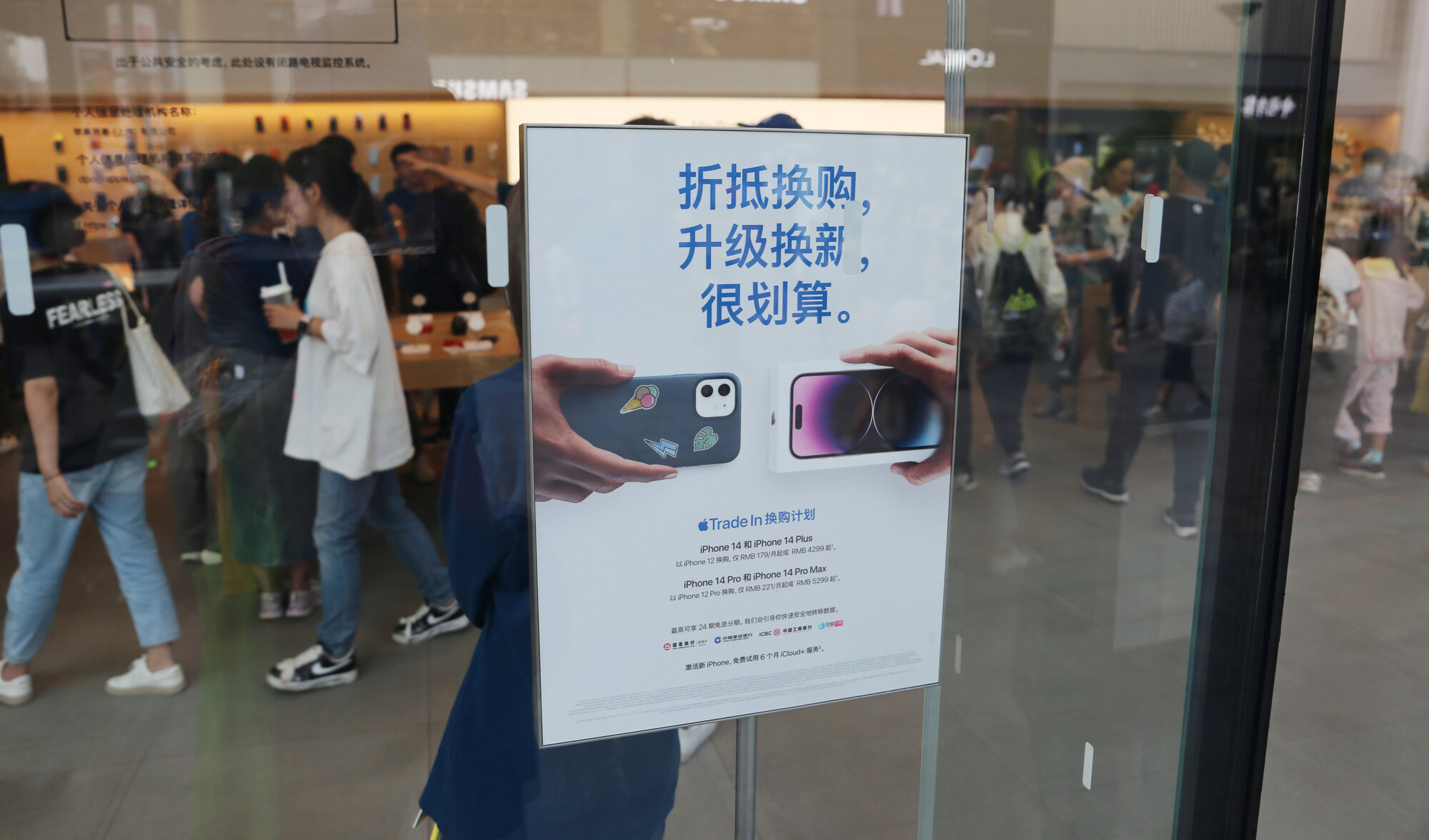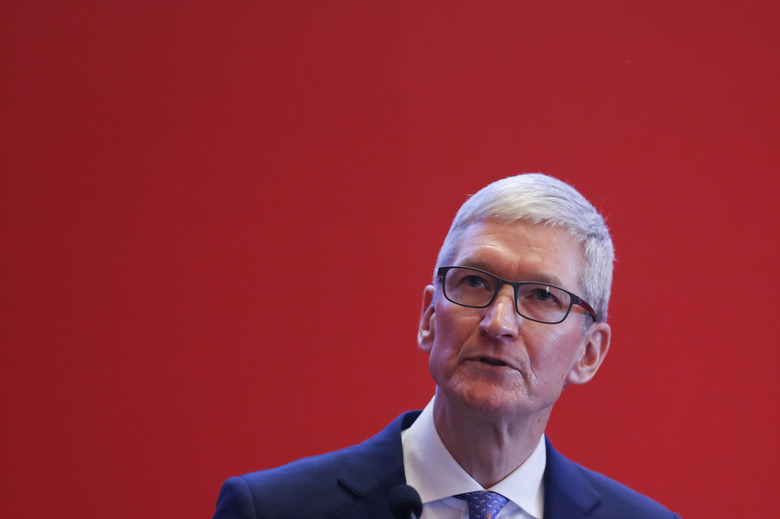Apple's Relationship With China Is An Odd Look For A Company That Talks So Much About Values
Javier Milei, the firebrand economist who's currently the frontrunner in Argentina's presidential contest, recently shared with an interviewer the rationale for why he'd freeze relations with China if he's elected. "People are not free in China," he mused, before adding that: "They can't do what they want. And when they do it, they get killed." And then, in light of how the Chinese Communist Party treats its enemies, Milei summed up his stance on the matter by posing an obviously rhetorical question: Would you do business with a hitman?
Not long after he made those incendiary comments, US Commerce Secretary Gina Raimondo said during public remarks that US business leaders keep telling her that "China is uninvestable." That the cost of doing business there is too high, as a result of raids, fines, updates to China's counterespionage law, and many other risks — to say nothing of the country's human rights abuses and the totalitarian regime that requires onerous compromises from its business partners. One business leader you won't hear such talk from, though? That would be the much more reluctant-to-offend Apple CEO Tim Cook, who was asked about this very thing in a CBS News interview that aired a few days ago.
"We've been there for 30+ years," Cook said about China. "There are some complexities dealing with business in any foreign country, because you're dealing with different laws and regulations than you're used to in your home country.
"I believe in engagement. I believe that you can always find things to work on together."

'Do you think it's problematic to do business with the Chinese Communist Party?'
Set aside the fact that such comments ignore what awaits any of China's 1.4 billion citizens whose own idea of "engagement" might involve saying something not nice about President Xi Jinping. Cook's answer is the kind of measured posture that he prefers to share in response to the China question — whenever, that is, he feels compelled to say anything at all.
For every diplomatic response like the one Cook provided to CBS News' John Dickerson, for example, there are just as many occasions when he stares blankly, in stone-faced impassivity, as he did during a December 2022 visit to Washington to meet with lawmakers. While he strode through the corridors of power, a reporter approached him.
"Hi Mr. Cook, do you support the Chinese people's right to protest?"
No answer.
"Do you have any reaction to the factory workers that were beaten and detained for protesting Covid lockdowns?"
Cook keeps walking.
"Do you regret restricting AirDrop access that protestors used to evade surveillance from the Chinese government? ... Do you think it's problematic to do business with the Chinese Communist Party when they suppress human rights?"
Like the man said, there are indeed some "complexities" in dealing with a country like China.
The numbers behind the Apple-China relationship
Behind that complexity, though, lies the stark simplicity of what's more or less a math problem: Currently, something on the order of 80% of Apple's nearly $400 billion annual revenue is derived from the sale of hardware. And the vast majority of that hardware, as much as 90%, is still assembled in China. In a country, I might add, that a four-star Air Force general earlier this year predicted the US will quite possibly be at war with by 2025.
Granted, I'm not the chief executive of a multinational corporation that also happens to be the most valuable company on the planet, so it's easy and consequence-free for me to make this next point. Having said that, it couldn't be any clearer to me that it's long past time for Apple to remove itself from China — factories, retail stores, everything — for any of a growing number of reasons. In fact, where do I even start? Among other things, the price Apple has paid to keep doing business in China has included: Acquiescing to the removal of VPN and other apps from Apple's App Store in China; as well as allowing iCloud data of Chinese users to be stored on government-controlled servers.
"The Chinese are serial iPhone breakers," Ross J. Anderson, a University of Cambridge cybersecurity researcher, told The New York Times in 2021. This, in other words, is who Apple under Cook still thinks it's important to do business with. A country that no US businesspeople enter without, at a minimum, a security detail — and certainly with a burner phone on hand rather than a personal device of their own. A country that's also been accused, per the BBC, of possible genocide against its Uyghur and Muslim ethnic groups.
I'm being too simplistic, you say? You want to talk about simplistic? Let's talk about the laughably childish notion that's also one of the reasons why companies like Apple do business in China in the first place: It's the so-called "golden arches" theory of diplomacy or conflict prevention, articulated by commentators like Thomas Friedman. Basically, it's the idea that two countries that each have McDonald's restaurants don't end up going to war with each other. More specifically, that there's a soft power to desirable American goods and services, so much so that it overrides any negative feelings that a populace might otherwise have about us.
Maybe that works on Chinese consumers, but I defy you to show me proof that such a philosophy has had any impact whatsoever on the Chinese regime itself — beyond enriching, to a certain degree, that very regime. Relations between both countries are so icy at the moment, in fact, that an aide to China's president recently warned that "conflict and confrontation" are very likely in the near future. Besides, is it not better to let the desire of a country's citizenry to be part of the rest of the world force changes in that country's leadership, rather than comprising yourself to keep the iPhone revenue flowing?
It all comes down to money
That leaves just one other reason why Apple remains locked in an embrace with China — and why Cook goes out of his way to say nice things about China, to meet with Chinese officials, and engage in photo-ops like he did earlier this year, when he smiled and posed with customers and staff at an Apple store in the fashionable Sanlitun district of Beijing. Far from the de-coupling that many US lawmakers press companies like Apple for, to disentangle themselves from China, Apple's relationship with the country not only remains strong but also cuts both ways.
As of earlier this year, the vast majority of the workforce comprising Apple's supply chain remains in China. That relationship can also be felt stateside, as well; as of this writing, several of the "Top Free Apps" here in the US Apple App Store have connections to China — including TikTok, as well as the fashion retailer Shein, the shopping app Temu, and video editing app CapCut. In fact, Apple spotlights TikTok in a separate ranking inside the App Store, which curates a list of "Must-Have Apps."
Yes, Apple is diversifying (air quotes) its supply chain by moving more manufacturing to countries like India and Vietnam. But even in the most optimistic scenario, that effort is years away from being able to completely and totally supplant what Apple is doing now in China — even if Cook supported such a prospect, which I don't think he does, necessarily. And as to how difficult that decoupling from China is, consider: According to one estimate I read this week, the number of employees in Chinese factories is greater than ... the entire population of Vietnam.
So, it's practical and monetary considerations that keep the iPhone giant wedded to the #1 strategic enemy of the US at the moment. Per a recent report from The Financial Times: "Cook, explaining why Apple couldn't manufacture at scale in the US, once told an audience that if every tool and die maker in America were invited to the auditorium where he was speaking, they 'wouldn't fill the room'. Whereas in China, 'you would need several cities to fill with tool and diemakers'."
That's what this comes down to, and it's a shame. It's not like Apple isn't willing to ever let its values trump business concerns. When Russia invaded Ukraine last year, for example, the iPhone maker had no problem fleeing Putin's empire along with scores of other US companies. As to the practicality of decoupling from China, even if Apple wanted to draw a line like it did for Russia, the refrain of excuses you hear includes the usual suspects like — Nowhere else has sufficient infrastructure. It would cost too much. It would make the price of iPhones astronomical.
Which rather sounds, to me, like saying: Something is only the right thing to do, as long as it's not prohibitively expensive.

